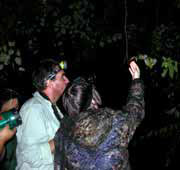Teaching Philosophy
By guiding students through the scientific process, and teaching them to critically evaluate scientific arguments and data, I challenge them to engage the material at a deeper level. From my courses, students will gain the ability to formulate their own hypotheses and evaluate the arguments (scientific or not) they encounter in the literature and in the popular press.
 I feel strongly that writing develops hand-in-hand with critical thinking and is one of the most important skills a student can develop in college, no matter which field of study they eventually pursue. Over the course of my Animal Behavior class, students progressed from learning to evaluate data and write a scientific paper based on one experiment to the higher levels of integration needed for a critical and substantial review of a current topic in behavior. Past reviews, in the format of Trends in Ecology and Evolution, have included such topics in behavior as: a review of queen:worker conflicts in social insects, parental care in reptiles, and the adaptive significance of social play.
I feel strongly that writing develops hand-in-hand with critical thinking and is one of the most important skills a student can develop in college, no matter which field of study they eventually pursue. Over the course of my Animal Behavior class, students progressed from learning to evaluate data and write a scientific paper based on one experiment to the higher levels of integration needed for a critical and substantial review of a current topic in behavior. Past reviews, in the format of Trends in Ecology and Evolution, have included such topics in behavior as: a review of queen:worker conflicts in social insects, parental care in reptiles, and the adaptive significance of social play.
The skills and talent required to do excellent research can be taught, and I advocate a laboratory component to each course, to give students the experience of designing and conducting research. I also encourage students to start writing before they have finished collecting their data. In the course of writing an introduction one often realizes what critical experiments have been left out of the study, and it is better to realize this while one still has the chance to complete them.
Mentoring Philosophy
Mentoring students has been a rewarding part of my teaching experience. I believe that effective mentors respect students as future colleagues, invest in explaining the context of research questions, and then allow students to develop their own ideas.
I urge students to begin research early, and remind them of the importance of hypotheses and critical evaluation of one's research. During my graduate and postdoctoral work, I have mentored more than 20 students, in both field and laboratory settings. I am currently advising several graduate student projects and undergraduate student projects that will result in publication of their research in peer-reviewed journals. My research is especially amenable to undergraduate research because students can begin doing exciting research in behavior with a minimum of training.
Teaching Experience
I have a wide-breadth of teaching experience, from research I universities to liberal arts colleges. I teach biology courses within an evolutionary framework and upper-level courses often have an intensive writing component. Past student evaluators have commented:
- "The best class I have ever taken and now I'm pounding my head into the wall for not ever considering being a biology major of some sort."
- "Her energy is infectious and her presentations fascinating."
- "My writing from a scientific point of view has improved."
- "Lectures were very interesting, especially when she talked about hot topics and current research."
- " More work than the other courses."
- " Fantastic teacher." "She would often go above and beyond."
- " The best course I've taken!"
Teaching Interests
I am well-prepared to teach a number of lecture courses such as Introductory Biology, Evolutionary Biology, Animal Behavior, Molecular Evolution, Genetics, Quantitative Genetics, Entomology, Insect Systematics, Conservation Genetics, and Invertebrate Zoology. I am especially interested in teaching experimental design/statistical courses and organizing field courses.
I am also prepared to teach more specialized seminars on such topics as Behavioral Genetics, Phylogenetic Analysis, Speciation, Sexual Selection, and Biology of Spiders. To foster diverse, interdisciplinary interactions among faculty and students, I would be interested in leading seminars on grant writing and scientific illustration and communication (e.g., how to give effective talks at scientific meetings). Finally, I am eager to help develop a core curriculum for graduate students as that training was important to my own development as a scientist.